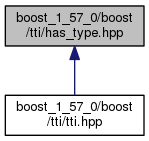#include <boost/config.hpp>#include <boost/preprocessor/cat.hpp>#include <boost/tti/gen/has_type_gen.hpp>#include <boost/tti/gen/namespace_gen.hpp>#include <boost/tti/detail/dtype.hpp>#include <boost/tti/detail/ddeftype.hpp>

Macros | |
| #define | BOOST_TTI_TRAIT_HAS_TYPE(trait, name) |
| BOOST_TTI_TRAIT_HAS_TYPE is a macro which expands to a metafunction. More... | |
| #define | BOOST_TTI_HAS_TYPE(name) |
| BOOST_TTI_HAS_TYPE is a macro which expands to a metafunction. More... | |
| #define BOOST_TTI_HAS_TYPE | ( | name | ) |
BOOST_TTI_HAS_TYPE is a macro which expands to a metafunction.
The metafunction tests whether an inner type with a particular name exists and, optionally, whether a lambda expression invoked with the inner type is true or not.
name = the name of the inner type.
generates a metafunction called "has_type_'name'" where 'name' is the macro parameter.
template<class BOOST_TTI_TP_T,class BOOST_TTI_TP_U>
struct has_type_'name'
{
static const value = unspecified;
typedef mpl::bool_<true-or-false> type;
};
The metafunction types and return:
BOOST_TTI_TP_T = the enclosing type in which to look for our 'name'.
BOOST_TTI_TP_U = (optional) An optional template parameter, defaulting to a marker type.
If specified it is an MPL lambda expression which is invoked
with the inner type found and must return a constant boolean
value.
returns = 'value' depends on whether or not the optional BOOST_TTI_TP_U is specified.
If BOOST_TTI_TP_U is not specified, then 'value' is true if the 'name' type
exists within the enclosing type BOOST_TTI_TP_T; otherwise 'value' is false.
If BOOST_TTI_TP_U is specified , then 'value' is true if the 'name' type exists
within the enclosing type BOOST_TTI_TP_T and the lambda expression as specified
by BOOST_TTI_TP_U, invoked by passing the actual inner type of 'name', returns
a 'value' of true; otherwise 'value' is false.
The action taken with BOOST_TTI_TP_U occurs only when the 'name' type exists
within the enclosing type BOOST_TTI_TP_T.
Example usage:
BOOST_TTI_HAS_TYPE(MyType) generates the metafunction has_type_MyType in the current scope to look for an inner type called MyType.
has_type_MyType<EnclosingType>::value is true if MyType is an inner type of EnclosingType, otherwise false.
has_type_MyType<EnclosingType,ALambdaExpression>::value is true if MyType is an inner type of EnclosingType and invoking ALambdaExpression with the inner type returns a value of true, otherwise false.
A popular use of the optional MPL lambda expression is to check whether the type found is the same as another type, when the type found is a typedef. In that case our example would be:
has_type_MyType<EnclosingType,boost::is_same<_,SomeOtherType> >::value is true if MyType is an inner type of EnclosingType and is the same type as SomeOtherType.
| #define BOOST_TTI_TRAIT_HAS_TYPE | ( | trait, | |
| name | |||
| ) |
BOOST_TTI_TRAIT_HAS_TYPE is a macro which expands to a metafunction.
The metafunction tests whether an inner type with a particular name exists and, optionally, whether a lambda expression invoked with the inner type is true or not.
trait = the name of the metafunction within the tti namespace.
name = the name of the inner type.
generates a metafunction called "trait" where 'trait' is the macro parameter.
template<class BOOST_TTI_TP_T,class BOOST_TTI_TP_U>
struct trait
{
static const value = unspecified;
typedef mpl::bool_<true-or-false> type;
};
The metafunction types and return:
BOOST_TTI_TP_T = the enclosing type in which to look for our 'name'.
BOOST_TTI_TP_U = (optional) An optional template parameter, defaulting to a marker type.
If specified it is an MPL lambda expression which is invoked
with the inner type found and must return a constant boolean
value.
returns = 'value' depends on whether or not the optional BOOST_TTI_TP_U is specified.
If BOOST_TTI_TP_U is not specified, then 'value' is true if the 'name' type
exists within the enclosing type BOOST_TTI_TP_T; otherwise 'value' is false.
If BOOST_TTI_TP_U is specified , then 'value' is true if the 'name' type exists
within the enclosing type BOOST_TTI_TP_T and the lambda expression as specified
by BOOST_TTI_TP_U, invoked by passing the actual inner type of 'name', returns
a 'value' of true; otherwise 'value' is false.
The action taken with BOOST_TTI_TP_U occurs only when the 'name' type exists
within the enclosing type BOOST_TTI_TP_T.
Example usage:
BOOST_TTI_TRAIT_HAS_TYPE(LookFor,MyType) generates the metafunction LookFor in the current scope to look for an inner type called MyType.
LookFor<EnclosingType>::value is true if MyType is an inner type of EnclosingType, otherwise false.
LookFor<EnclosingType,ALambdaExpression>::value is true if MyType is an inner type of EnclosingType and invoking ALambdaExpression with the inner type returns a value of true, otherwise false.
A popular use of the optional MPL lambda expression is to check whether the type found is the same as another type, when the type found is a typedef. In that case our example would be:
LookFor<EnclosingType,boost::is_same<_,SomeOtherType> >::value is true if MyType is an inner type of EnclosingType and is the same type as SomeOtherType.